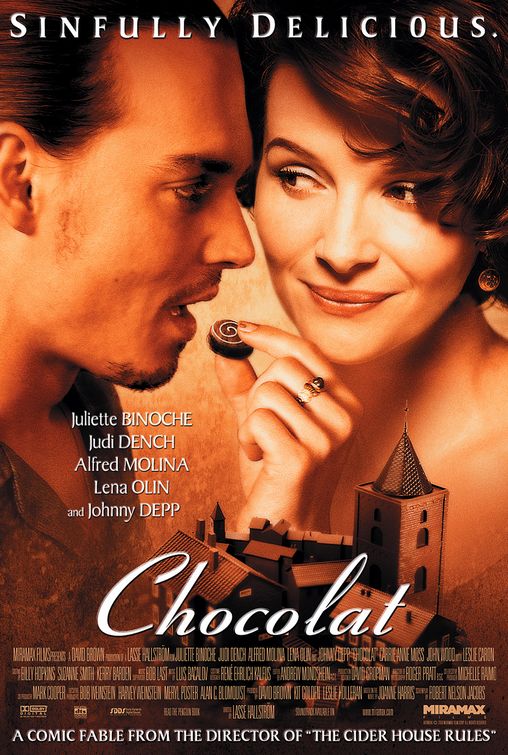“A Flawed Theological Lesson”

| None | Light | Moderate | Heavy | |
|---|---|---|---|---|
| Language | ||||
| Violence | ||||
| Sex | ||||
| Nudity |
What You Need To Know:
CHOCOLAT is an interesting, richly-made parable. It is a flawed theological lesson about the Christian doctrine of Law and Grace, including the Gospel of Jesus Christ. Part of that lesson is delivered by the young Catholic priest in the story. CHOCOLAT, however, does not fully rebuke the romantic, pagan, occult, and other anti-Christian notions in its story, which includes some brief sexual content and nudity. There are also some politically-correct elements which may lead many viewers to take a wrong approach to the movie’s Christian content. Still, near the end of the story, the movie clearly shows that a pagan, sometimes occult, lifestyle has not been able to fully satisfy either Vianne or her young daughter
Content:
(RoRo, PaPa, O, PC, AB, CC, LL, V, S, NN, AA, DD, MM) Apparent romantic worldview with pagan religious content (such as references to a planned fertility celebration during Easter & a small chocolate statue of a fertility goddess (which is not worshipped, however) & some occult, politically correct & anti-Christian elements, all of which are nearly overcome by a strong Christian sense of the proper roles of Law & Grace, an element which is finally expressed by a young, inexperienced Roman Catholic priest, though in a general way that may be open to politically-correct interpretations; 11 mostly mild obscenities, 2 strong profanities & 3 mild profanities, plus woman admits she reads salacious literature; mild violence such as drunken, wife-beating husband tries to force wife to come back home, arsonist pours gasoline to set fire to burn two homes, homes shown burning, man breaks down door, man hit over head by frying pan, & man destroys store goods in fit of rage; implied sex between married couple after husband eats candy laced with some kind of aphrodisiac, nude engaged couple embrace erotically on bed, implied fornication, & man puts suspender back on shoulder after exiting tent where he was kissing a woman; partial sexual nudity in one scene; alcohol use & drunkenness; no smoking but woman makes herbal chocolates that affect people’s behavior in a way which loosens their inhibitions; and, miscellaneous immorality, such as wife-beating, legalism, gambling, rootlessness, arson, & stealing, most of which are rebuked at some point.
More Detail:
Although all Christians really should know what the Bible teaches about Law and Grace, many, regrettably, do not. This is clear in survey after survey by pollsters like the Barna Research Group. The problem is, a person can’t really understand the Gospel of Jesus Christ unless you have a proper understanding of Law and Grace. In fact, bloody wars have been fought over this issue. Churches may be able to deal with this fact and help Christians know the real truth about Law and Grace, were it not for another major problem: Many of these Christians, and some well-known heretics, have spread their willful ignorance of Law versus Grace among the general population, including children, non-believers and outright atheists. In other words, Christians have a theological mess on their hands.
Now, the Gospel of Jesus Christ tells us that Jesus died for our sins. If we repent and confess our sins before God and believe in the work of Jesus Christ during His life, death and resurrection, God will forgive us of our sins (past, present and future) and fill us with the power of the Holy Spirit. The Holy Spirit will then circumcise our hearts so that we can live our lives according to the Law of God, of which Divine Love (1 Cor. 13) is the most perfect instrument of all. Although our sins are forgiven, that does not mean we no longer have to behave in a moral fashion, according to God’s Law. Nor does it mean, however, that we should become legalistic and self-righteous about God’s Law, lording it over other people, including those people who have yet to accept the Gospel of Jesus Christ. Thus, both the Law of God (which convicts us of our sins) and the Grace of God (which saves us from those sins) should play a role in all of our lives.
In the story of CHOCOLAT, Alfred Molina plays Paul, the legalistic Comte de Reynaud. Paul is very proud of the fact that one of his Roman Catholic ancestors kicked the Protestant Huguenots out of the town long ago. Vianne, a beautiful woman of South American and French descent played by Juliette Binoche, opens up a chocolate store during Lent, a holy period of Christian abstinence. This outrages Paul because it offends his fanatic moralism. It also doesn’t help matters that Vianne does not go to church and carries the pagan Mayan ornaments that her dead mother bequeathed to her.
When her mother’s herbal chocolate recipes seem to loosen the inhibitions of the town’s citizens, Paul takes some drastic actions, even enlisting the help of the town’s young, inexperienced priest. Vienne fights back, with help from the friends she and her daughter have accumulated. Then, another unusual outsider, an Irish riverboat traveler played by Johnny Depp, awakens Vianne’s own secret desire: to truly belong. Eventually, Paul learns something about the true nature of the Gospel of Jesus Christ, including some truths about Law and Grace. In an Easter sermon, the young priest tells Paul, Vianne and the whole town that Christ teaches that each person should “measure goodness by what we embrace, what we create and who we include.” His words seem to help Vianne finally rid herself of most, if not all, of the pagan rootlessness she inherited from her mother. Consequently, she too seems to learn some of the truth regarding Law and Grace.
Christian loving kindness seems to be the foundation for the priest’s important final lesson in CHOCOLAT. Thus, apparently, the characters in the movie eventually come to a better understanding of Law and Grace, and the meaning of the Gospel of Jesus Christ. However, CHOCOLAT does not fully rebuke the romantic, pagan, occult, and other anti-Christian notions in its story, which includes some sexual content and nudity. There are also some politically-correct elements in CHOCOLAT which may lead many viewers to take a wrong, politically-correct approach to the priest’s final words. Such a PC approach leads to a godless lawlessness without Jesus Christ rather than a grace-filled lawfulness founded on Jesus Christ.
Thus, in the final analysis, CHOCOLAT is a flawed theological lesson about Law and Grace. It is, however, a very entertaining, provocative lesson.
It is also extremely well-acted, including by the many supporting performers, not the least of whom is Dame Judi Dench, who plays a cantankerous grandmother estranged from her daughter, played by Carrie-Anne Moss of THE MATRIX.
Astute Christians can use CHOCOLAT, therefore, to spread the biblical truth about Law and Grace, as well as the biblical truth about the Gospel of Jesus Christ. The movie is an interesting, richly-made parable that stays with one after one leaves the theater. In fact, the very idea that the movie contains lots of different worldview elements may help Christians to tell those who see it just what makes Christianity superior to these other worldviews. In that light, it is extremely interesting to note that the movie clearly shows that a pagan, sometimes occult, lifestyle has not been able to fully satisfy either Vianne or her daughter. At the end of the movie, both characters let go of the pagan fantasies which have made them outcasts among other people. The fact that they also finally go to church on Sunday also sends a definite positive message. Thus, there are hidden treasures in this flawed movie.







